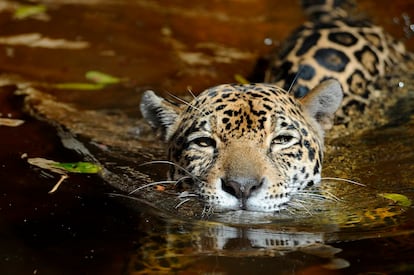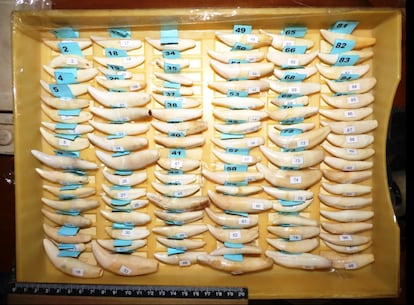Buying a jaguar claw necklace online: How Mexico is leading the illegal feline parts trade
Recent research indicates that social media has become a popular showcase for a business worth around $2 million


“We thought the country where we would find the most jaguar parts for sale online would be Bolivia. We never imagined Mexico would emerge as number one,” says Kurt Duchez, an anti-wildlife trafficking officer for the Wildlife Conservation Society (WCS) Mesoamerica, still sounding surprised. As part of a group of more than 20 researchers from around the world who, in 2023, published a study tracking how this feline was illegally trafficked on 31 digital platforms between 2009 and 2019, he was intrigued about what was happening in Mexico.
Until now, most reports on the illegal trade in jaguar body parts focused on Bolivia, Suriname and China. It was a familiar, established pattern. But when the focus shifted from large seizures to what was being openly offered on Facebook and other social media, Mexico, with 23%, became the country with the most posts selling jaguars or their parts, followed by Brazil (21.8%), Vietnam (16.7%), and Bolivia (12.4%).
To begin to understand how this illegal trade was operating in the country, Duchez called on big cat experts Jeremy Radachowsky and Antonio de la Torre to conduct a similar investigation, but with several species. De la Torre, a Mexican citizen and member of the civil association Bioconciencia, was in charge of tracking what he found online. Between April 2021 and May 2022, he browsed eight platforms (Google, Bing, Yahoo, Facebook, Mercado Libre, Segunda Mano, eBay and Etsy) and found a total of 713 posts that included elements of the wild cat trade in Mexico between 2011 and 2022.
“It’s not a hidden or black market,” says De la Torre, noting that he didn’t go to either the deep web or the dark web. Everything was found in Facebook groups or other platforms after searching with keywords like claws, fangs, crafts, or amulets. In total, the team identified nine species that were being traded. Five are native to Mexico — the jaguar (Panthera onca), the puma (Puma concolor), the ocelot (Leopardus pardalis), the margay (Leopardus wiedii), and the lynx (Lynx rufus). But parts of lions, tigers, leopards, and cheetahs that are not native to the region were also being sold, as reported in a study published in Animal Conservation this year.

“Our hypothesis is that these latter animals are being raised in the country,” says the Mexican. They are purchased, fed, and, when they are large enough, killed to sell their skins, teeth, or skulls. Meanwhile, endemic animals — like the jaguar, which is the most frequently traded, accounting for 59% of the total — are being hunted and butchered.
Although the sellers are located throughout Mexico, research indicates that the areas where it is most promoted are Mexico City (28%), Felipe Carrillo Puerto in Quintana Roo (22%), Monterrey in Nuevo León (5.7%), Tehuacán in Puebla (5.6%), and Toluca in the State of Mexico (3.9%). Demand is also local. Eighty-seven percent of interested users are located in Mexico, followed by six other countries such as the United States, Vietnam and Indonesia, which together account for just 12%.
“The largest jaguar population in Mexico is on the Yucatán Peninsula,” Duchez recalls. And it is precisely there that many artists and street vendors seeking to impress the tourists wear necklaces made of puma teeth or feline skins. It’s an aesthetic that is costing the country its biodiversity. If, for example, there are an estimated 4,000 to 4,800 jaguars in the country, “online commerce could be affecting at least 1.4% or 1.7% of the population.” The business has skillfully shifted to online platforms, accounting for sales worth nearly $2 million in the last 10 years.
Packages with fangs
The study includes an anecdote that serves to illustrate how brazenly and easily this illegal trade is carried out. In one post, a seller in Mexico tagged a user in the United States who had purchased a jaguar claw necklace. Days later, the customer uploaded a photo online of themselves wearing it. They were a happy consumer. In fact, De la Torre remarks that part of the reason he was able to find out where the feline parts were being purchased is because some sellers upload photos of the packages they are about to send via international parcel service, including the postal code.
Teeth, skulls, and bones travel this easily. “Something I would like to point out is that these companies should have some verification mechanism to prevent the delivery of wildlife parts,” he says. It’s a request that could be extended to online platforms. In fact, in 2021, Mercado Libre signed an agreement with WCS to begin detecting online offers of endangered species protected by international conventions.

However, it’s a difficult task to achieve on social media, Duchez believes. On Facebook, for example, trade is conducted through private groups, and censoring any posts about protected animals would be counterproductive. What both consider urgent is not only for Latin American cybersecurity units to dedicate resources to online wildlife trafficking, but also for the Mexican government to be more cautious about granting permits to breed big cats. The country doesn’t prohibit doing so with a license, which poses a significant risk. “I suspect that most people who have obtained authorization to do so don’t comply with the regulations,” De la Torre adds. His colleague shares his concern about a market he describes as “latent.”
Selling an ocelot fang or a lynx claw in a physical Mexican market is something that is becoming less and less common. A taboo is beginning to develop around it, perhaps even a conscious awareness. So, to avoid exposure, the illegal feline trade has adapted to a new logic, in which neither the seller nor the consumer countries are the same. A place where social media has become, once again, a perfect showcase.
Sign up for our weekly newsletter to get more English-language news coverage from EL PAÍS USA Edition
Tu suscripción se está usando en otro dispositivo
¿Quieres añadir otro usuario a tu suscripción?
Si continúas leyendo en este dispositivo, no se podrá leer en el otro.
FlechaTu suscripción se está usando en otro dispositivo y solo puedes acceder a EL PAÍS desde un dispositivo a la vez.
Si quieres compartir tu cuenta, cambia tu suscripción a la modalidad Premium, así podrás añadir otro usuario. Cada uno accederá con su propia cuenta de email, lo que os permitirá personalizar vuestra experiencia en EL PAÍS.
¿Tienes una suscripción de empresa? Accede aquí para contratar más cuentas.
En el caso de no saber quién está usando tu cuenta, te recomendamos cambiar tu contraseña aquí.
Si decides continuar compartiendo tu cuenta, este mensaje se mostrará en tu dispositivo y en el de la otra persona que está usando tu cuenta de forma indefinida, afectando a tu experiencia de lectura. Puedes consultar aquí los términos y condiciones de la suscripción digital.








































